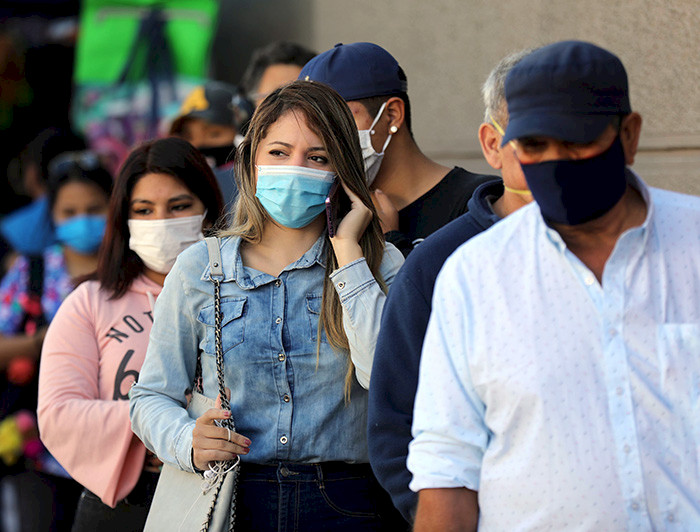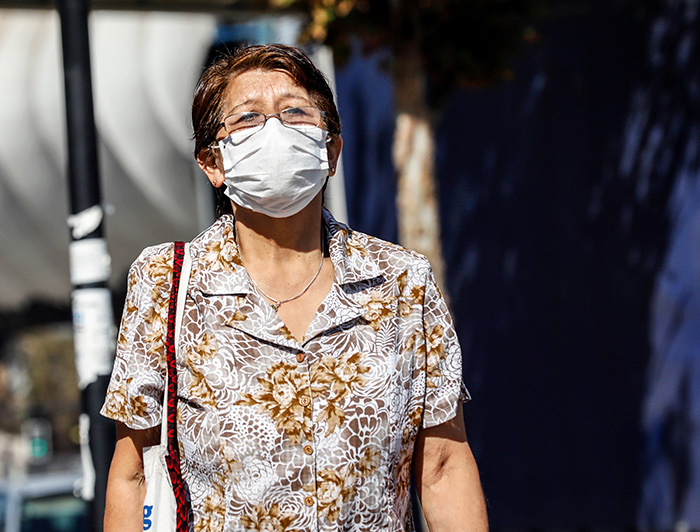Is it Possible to Reconcile Health and Economy?
Three UC faculty members, all experts in macroeconomics, used an epidemiology model to discover how health protocols inside businesses reduce infections, despite being expensive. They determined that if these protocols are applied in critical sectors of the economy, they could prevent a second wave of diseases and even increase the GDP.

photo_camera "Covid-19 contagion, economic activity, and business reopening protocols" is the paper published in the Journal of Economic Behavior and Organization by Caio Machado, Javier Turen, and Alexandre Janiak, faculty members from the Institute of Economics. (Photo by Karl Chinga Grawe/AgenciaUno)
While vaccines are a beacon of hope, it will probably be a long time before we stop wearing masks and using hand sanitizer. While we have to learn to live with the virus, it is also imperative to reactivate the economy. For many people, that means returning to face-to-face activities, at least part-time.
To do this, companies must comply with a series of health protocols, which -according to a study also carried out by professors from the Faculty of Economics and Administration and the UC Public Policy Center- are expensive, especially for smaller companies.
Determining the effect of these protocols on Chilean companies was precisely the paper's objective published in the Journal of Economic Behavior and Organization by professors from the Institute of Economics, Alexandre Janiak, Caio Machado, and Javier Turen.
To achieve this, they used the SIR model (mathematical modeling of infectious diseases) that helps epidemiologists study the spread of viruses such as influenza and Covid.
The paper says the level of infection depends on how much is consumed and produced within the sector. In turn, production can be limited as workers become infected, which means they temporarily leave the workforce.
The researchers considered different economic sectors - with varying levels of productivity and likelihood of contagion - and various companies' sizes within each industry. Using Chilean data, they calibrated the model and assessed the impact of recommended sanitary protocols on contagion and economic activity in the after-lockdown period.
As Alexandre Janiak explained, "On the one hand, these protocols have high fixed costs that can harm small businesses, but on the other hand, they reduce contagion and thus allow workers to go to work (if they do not get infected). We found that the second wave of infections is likely in the absence of protocols, but they reduce the Gross Domestic Product (GDP) if applied to all sectors of the economy. However, if they are applied to only some key sectors, we could avoid a second wave and have a higher GDP (as less sick workers are forced out of the labor force and can work)."
"The paper suggests that there are alternatives to lockdowns. It has been documented that they are not only harmful to the economy but also various aspects of our health," said Janiak. "The paper also suggests that the protocols must be somewhat effective to be relevant. It's important to have good oversight in this regard and to promote impeccable civic behavior. Otherwise, we could have a second wave," he said.
According to Caio Machado, "we were surprised that the protocols could improve both the economy and people's health in some situations. Initially, we thought that there would probably always be a trade-off between economy and health (that is, to reduce infections, one would have to accept greater economic losses). Still, the results of the study show that this is not always the case. Some policies manage to improve both."
"The protocols are necessary, and when they are well applied, they offer a real alternative to control infections, allowing the economy to open up after strict lockdowns. We see the protocols as a real alternative to stricter measures such as prolonged lockdowns," said Javier Turen.
Knowledge Applied to Public Policies

The three macroeconomics experts wanted to contribute from a scientific perspective, which motivated them to research health issues. "It motivates me to know that at times like this, I can apply part of my accumulated knowledge as a researcher to specific problems facing Chilean society," said Caio Machado.
After Francisco Gallego's and José Tessada's encouragement - the first one is a professor at the Institute and the second is the School of Administration director; the team decided to research to understand the pandemic's macroeconomic effects better. "We worked hard on the project for several months, mainly because of the importance of the topic for the Chilean situation. Given this, it is gratifying for us to be able to publish the study and thus install this type of debate in the literature, emphasizing the implications for our country," said Javier Turen.
"Personally, the project forced me to learn how to use tools that were unknown to me, in particular, to understand better epidemiological models to combine them with macroeconomic models. I believe that there are still many things that, as UC professors, we can contribute to the development of public policies in Chile," he said.
"This experience has taught me a lot about health and makes me want to apply this knowledge to other problems not necessarily related to COVID-19. For example, it could help to better understand some issues in development economics, where the concern for the fight against other diseases is constant," said Alexandre Janiak.
"I think that once a large part of the population is immunized, and the pandemic is over, many of its negative economic effects will persist for a long time. It will be important to understand what types of macroeconomic policies should be implemented to accelerate the recovery of the economy," concluded Caio Machado.
Read the "COVID-19 contagion, economic activity and business reopening protocols" paper.


